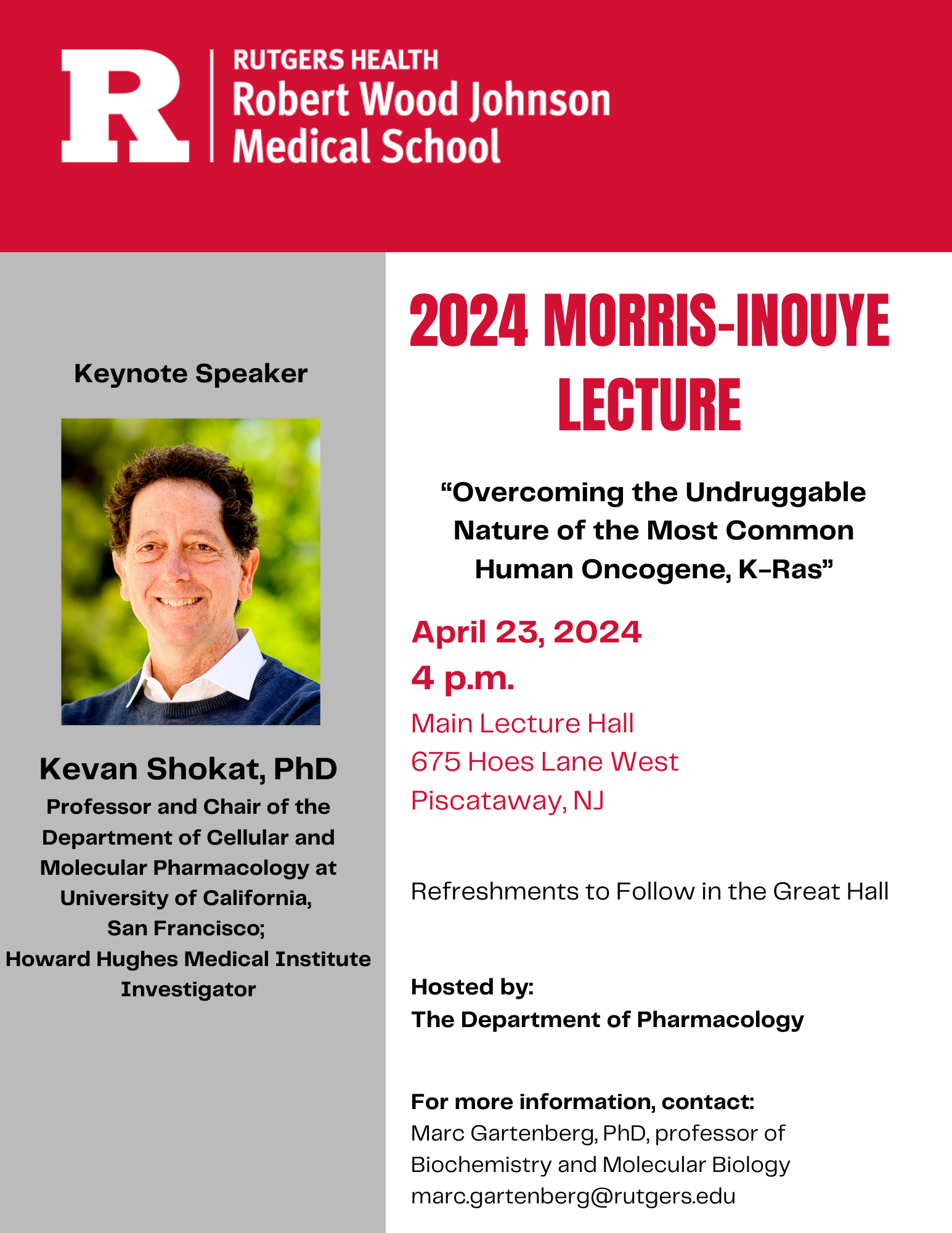Event Description
iJOBS Virtual Site Visit: Johnson & Johnson
Come learn about career opportunities for PhD level professionals at Johnson & Johnson. J&J is a leading pharmaceutical company with drug pipelines in infectious disease, cardiovascular, immunology, neuroscience, and oncology. We will hear from research scientists as well as those who have transitioned off the bench to contribute to the biopharma industry using the transferrable skills they gained in graduate school.
Click here to see slides and speaker's information.
Inaugural Morris-Inouye Lecture by Dr. Kevan Shokat
Lectures & Seminars
Event Description
Dr. Kevan Shokat will deliver the inaugural Morris-Inouye Lecture at 4 PM on April 23rd in the Main Lecture Hall of Robert Wood Johnson Medical School in Piscataway. His lecture is titled “Overcoming the Undruggable Nature of the Most Common Human Oncogene, K-Ras”. A reception will be held in the Great Hall will follow.
Dr. Shokat’s research focuses on the discovery of small molecule tools and drug candidates that target kinases, GTPases, and helicases. His laboratory utilizes the tools of synthetic organic chemistry, protein engineering, structural biology, biochemistry, and cell biology.
Dr. Shokat is currently an Investigator of the Howard Hughes Medical Institute, Professor in the Department of Cellular and Molecular Pharmacology at the UCSF and Professor in the Department of Chemistry at the UC Berkeley. He is the recipient of numerous prestigious awards and a member of the National Academy of Sciences, the National Academy of Medicine, and the American Academy of Arts and Sciences.

Congratulations to winners at Annual Biomedical Graduate Student Symposium hosted by MBGSO
Congratulations to the winners at the MBGSO Graduate Student Symposium!
Oral Presentation
First Place: Kiranmayi Vemuri
Second Place: Kyle Flannery
Poster Presentation
First Place: Leelabati Biswas
Second Place: Robert Madromootoo
Third Place: Reem Alatrash
Preparing Job Materials: A Co-Mentoring Session with Graduate Students and Postdocs
Hatchery Innovation Studio @ Alexander Library
169 College Ave
New Brunswick, NJ 08901
Event Description
Preparing Job Materials: A Co-Mentoring Session with Graduate Students and Postdocs
April 15, 2024
12:00-2:00pm ET
The Hatchery Innovation Studio at Alexander Library (169 College Ave., New Brunswick)
Applying for jobs can be an intimidating, time-consuming, and uncertain experience. This co-mentoring work session is designed to bring together graduate students and postdocs to share wisdom, ideas, and feedback with one another on job application materials for both academic and non-academic positions.
In an interactive, roundtable format, participants will both provide feedback on peers’ documents and receivefeedback on their own. Please bring 3 copies of one job application material (i.e., CV, teaching statement, diversity statement) on which you’d like to receive feedback from peers!
To attend this event, please sign up by April 10. Lunch will be provided!
Questions? Please contact Briana Bivens (briana.bivens@rutgers.edu), Janet Alder (janet.alder@rutgers.edu), and Itzamarie Chévere-Torres (ict@oq.rutgers.edu).
~This event is hosted and supported by the School of Graduate Studies, the Rutgers Health Office of Postdoctoral Affairs, and the Office of Postdoctoral Advancement and emerged from the ideation and advocacy of the SGS DEI Graduate Student Advisory Committee.~
Caregiver Professional Travel Grants for Teaching Assistants and Graduate Assistants
Per a recent side letter agreement between the University and the AAUP-AFT, the University is pleased to announce the launch of a short-term travel grant program for Teaching Assistants (“TAs”) and Graduate Assistants (“GAs”), which will be administered by the graduate schools.
Nicole Martinez
Contact
Phone
848-932-0975
Location
SEBS - Nutritional Sciences
225 Davison Hall
New Brunswick, NJ 08901
iJOBS Workshop: Top Tips for Publication Figures using BioRender
Professional Development
Event Description
Take your manuscript figures to the next level! Join us for a free workshop on creating better publication quality figures in BioRender. In this webinar, learn actionable tips and techniques for designing figures that will impress your manuscript reviewers.
Jennifer Tamas
Graduate Program Membership
Member Members of the graduate faculty may supervise doctoral dissertations and master's theses as well as serve on or chair doctoral and master's committees. Learn more by visiting the SGS bylaws page.
Contact
Email
gd@french.rutgers.edu
Phone
848-932-8223
Location
15 Seminary Place, French Department, 4th Floor
Rutgers Academic Building, West
New Brunswick, NJ 08901
iJOBS Site Visit: Colgate-Palmolive
Professional Development
Event Description
Colgate-Palmolive provides consumer products globally and employs PhD level scientists in many roles. Come meet those employees and learn how they have applied the various research skills learned in graduate school and postdocs to the consumer industry and tour the facility and labs.
IN PERSON ONLY 909 River Road, Piscataway, NJ
Click here to see contact information.
iJOBS Site Visit: Azenta Life Sciences
Professional Development
Event Description
As a global leader in R&D genomics services, Azenta (formerly Genewiz) leads the way in providing superior data quality with unparalleled technical support to enable researchers. A full-service provider, Azenta provides high throughput/next generation sequencing, Sanger DNA sequencing, gene synthesis, molecular biology, bioinformatics, and GLP regulatory services. Visit their location in person to more about the company, hear from PhD level employees who hold various positions at Azenta and tour the labs to see the company in action!
IN PERSON ONLY 111 Corporate Blvd, South Plainfield NJ
Click to see slides and contact information.